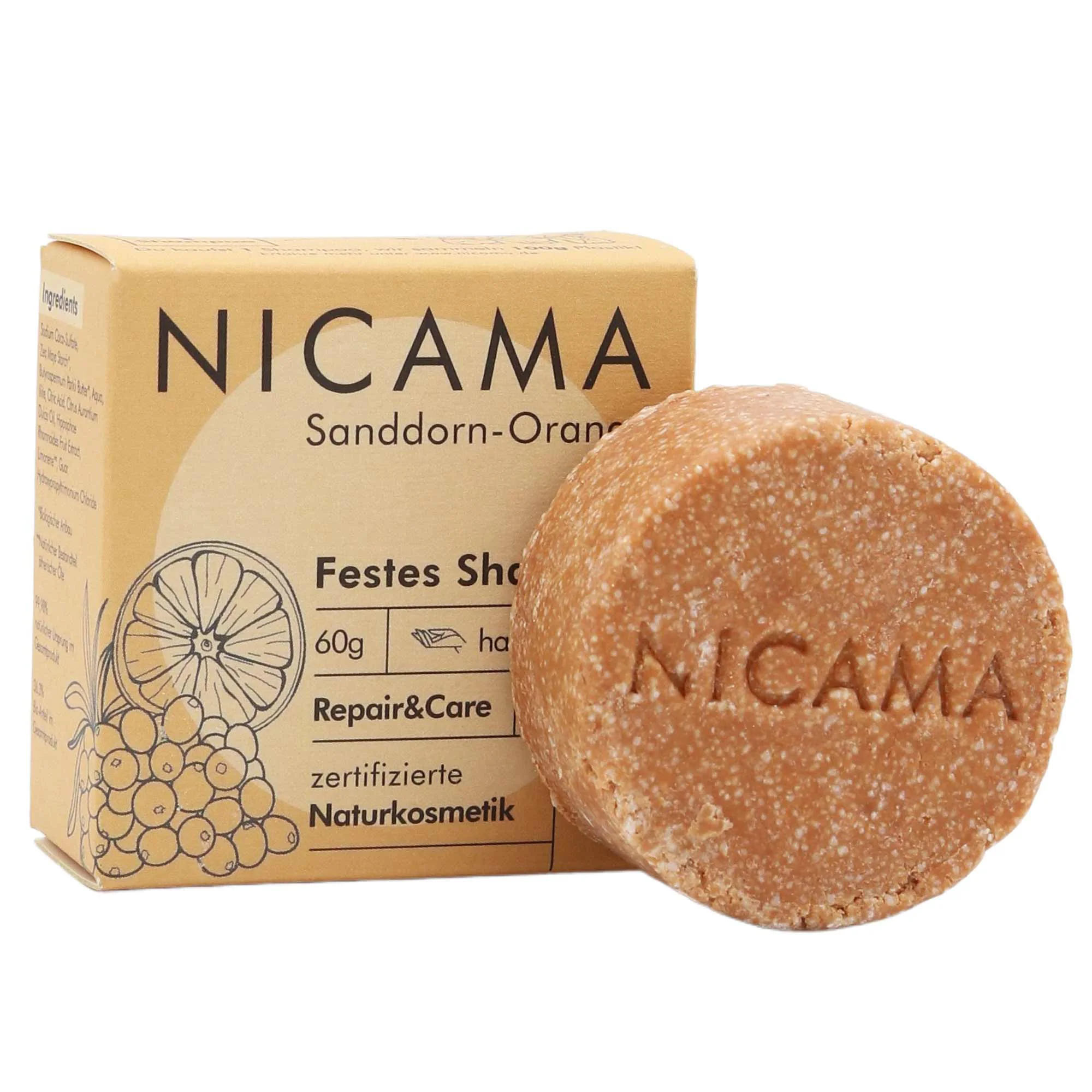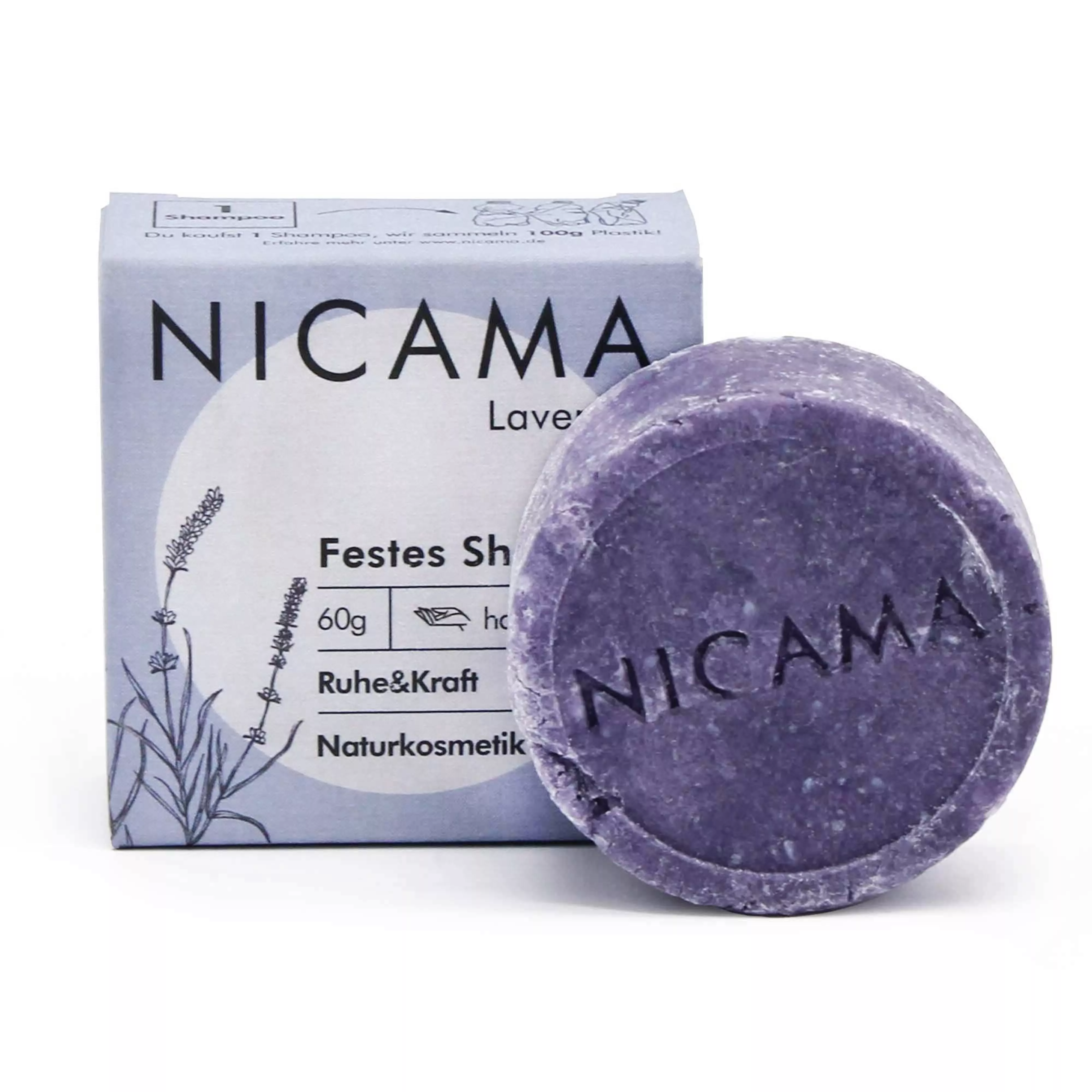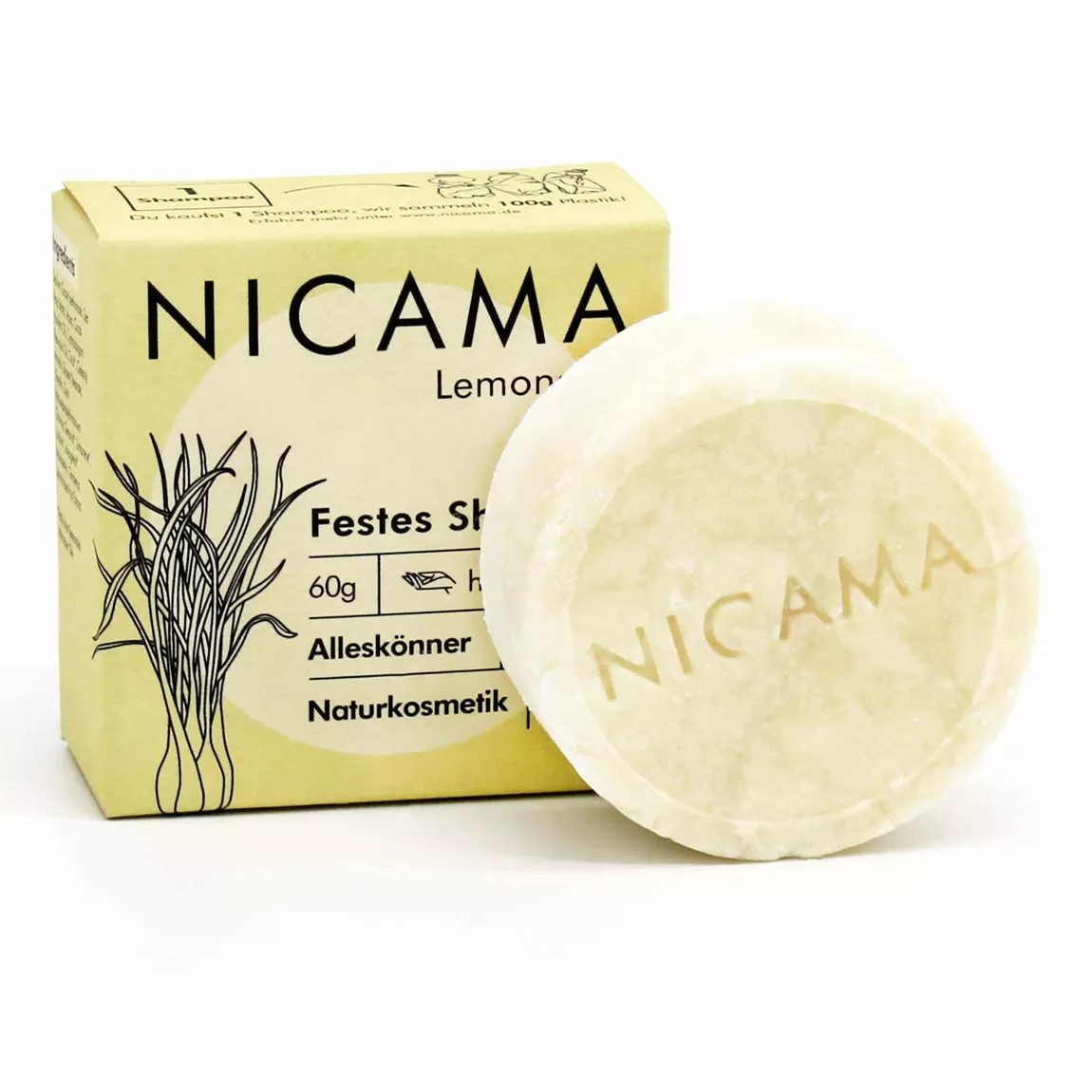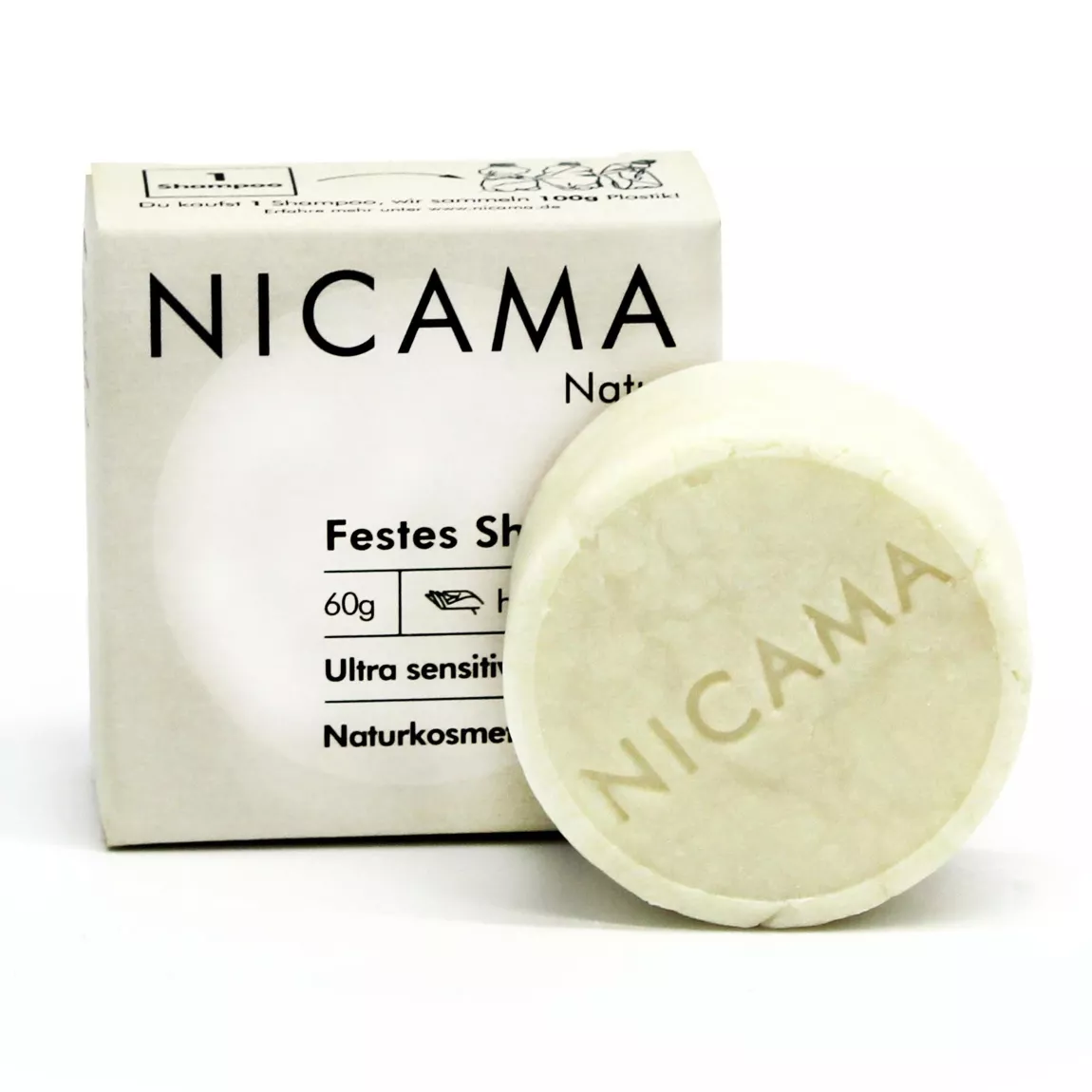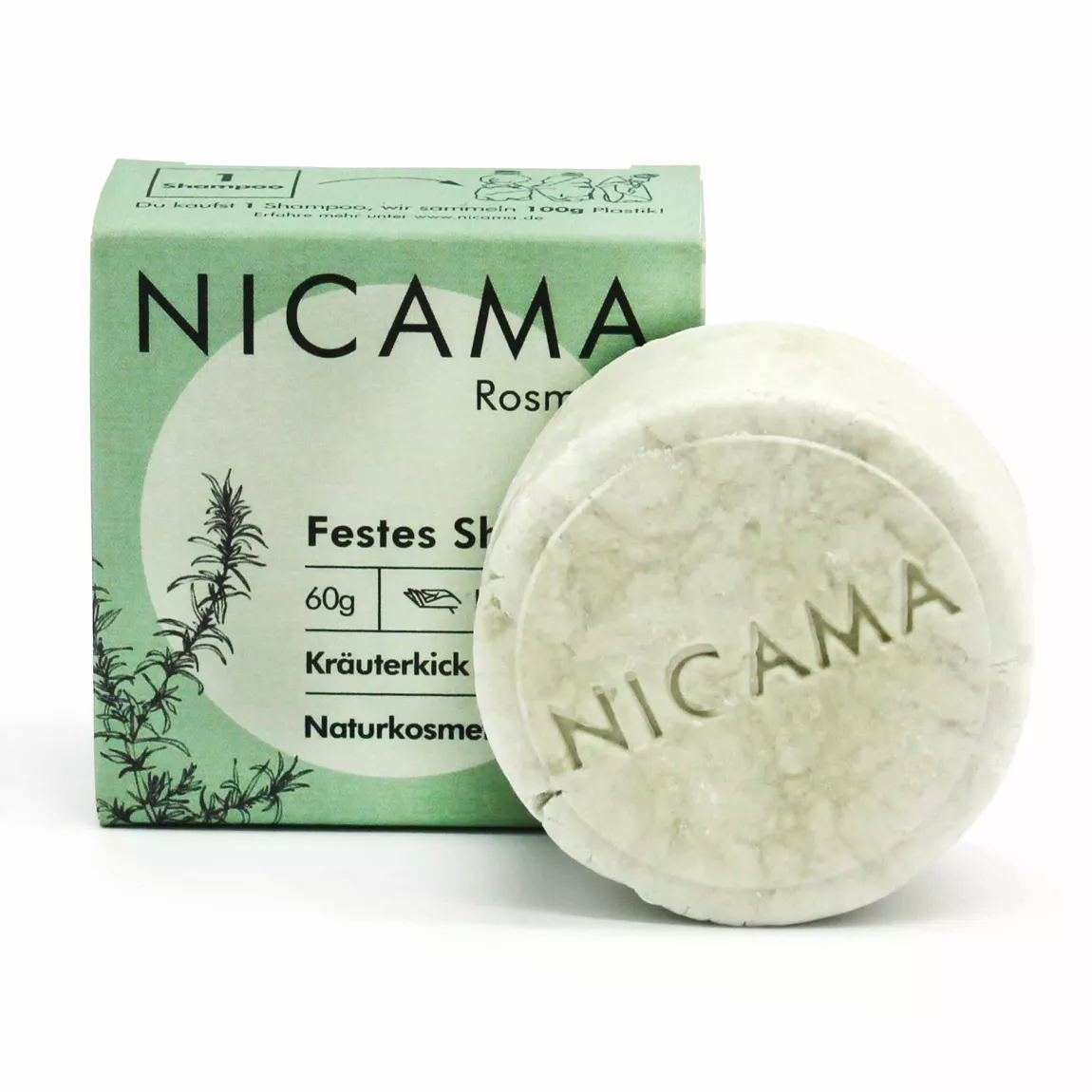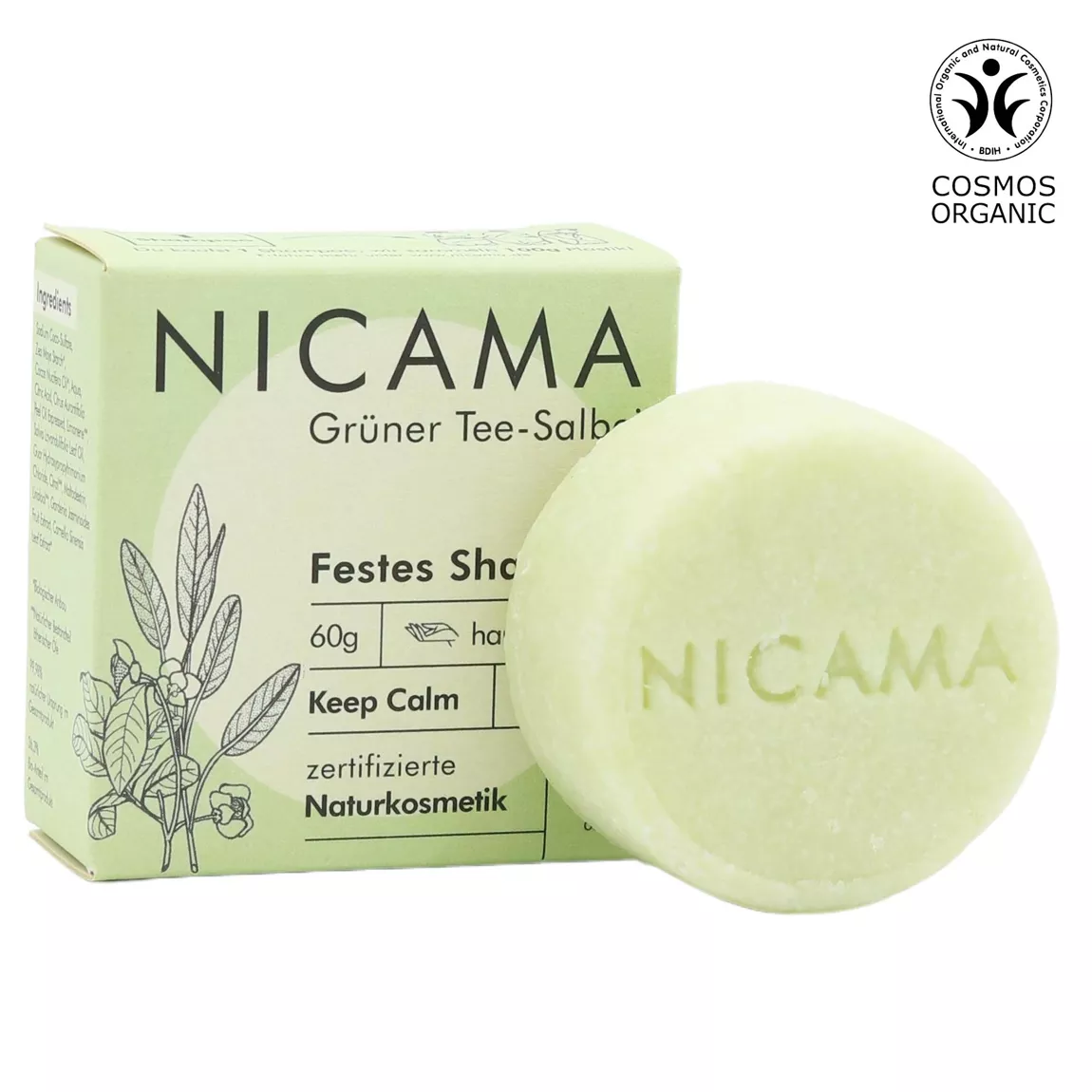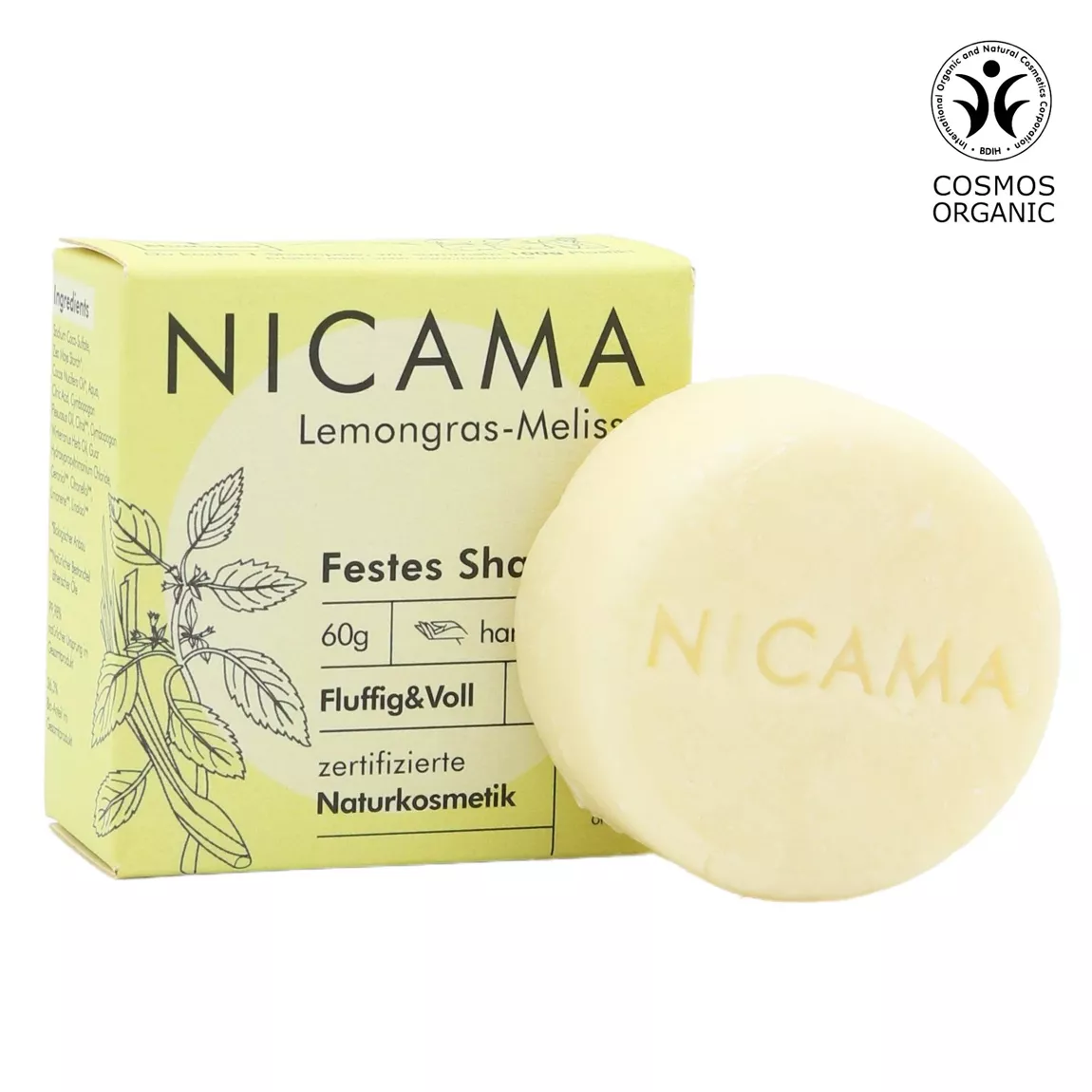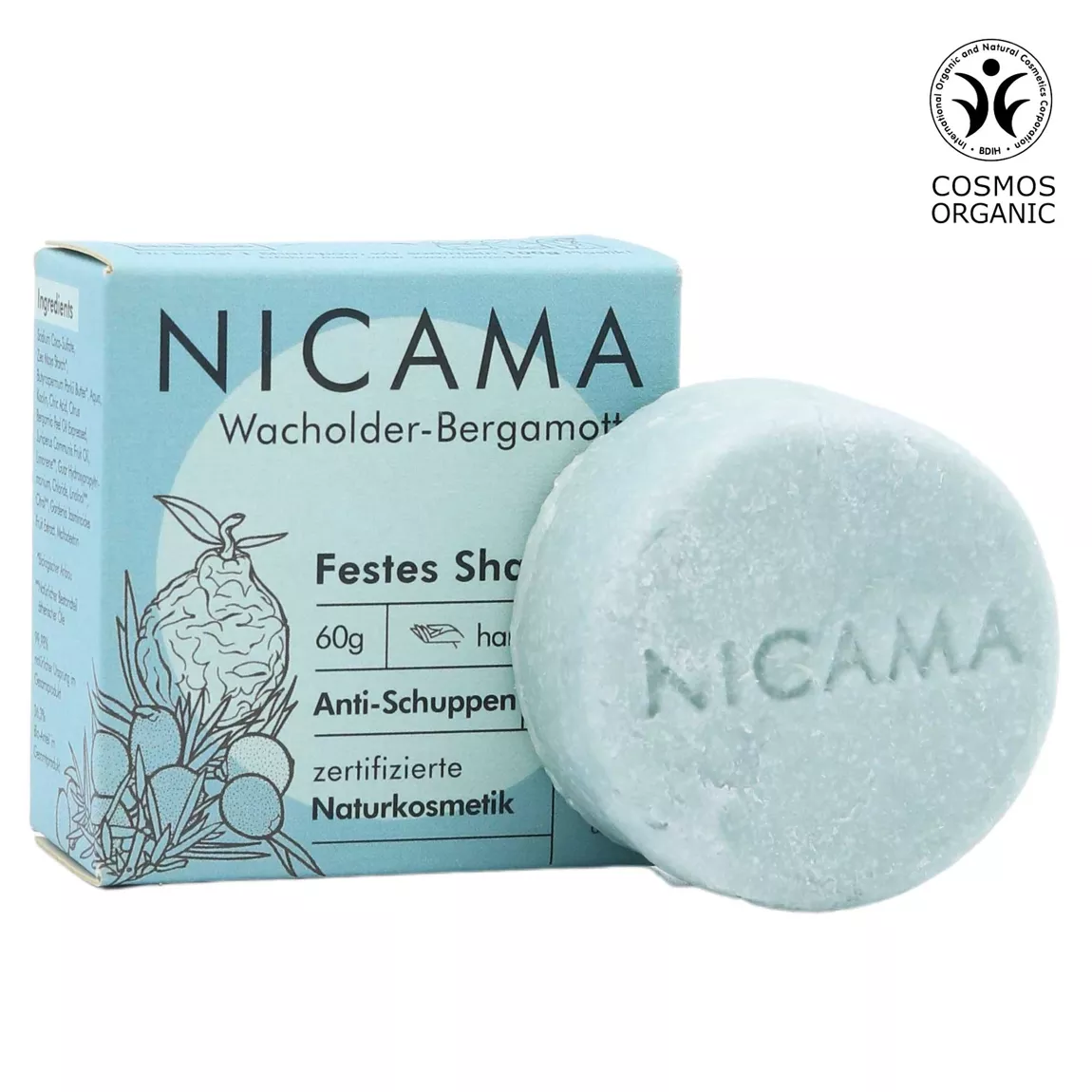Solid shampoo
Content: 60 Gramm (€14.92* / 100 Gramm)
Content: 60 Gramm (€14.92* / 100 Gramm)
Content: 60 Gramm (€14.92* / 100 Gramm)
Content: 60 Gramm (€14.92* / 100 Gramm)
Content: 60 Gramm (€14.92* / 100 Gramm)
Content: 60 Gramm (€14.92* / 100 Gramm)
Content: 60 Gramm (€14.92* / 100 Gramm)
Content: 60 Gramm (€14.92* / 100 Gramm)
What is solid shampoo and why is it becoming increasingly popular?
In recent years, a clear trend has emerged in the world of hair care: More and more people are opting for solid shampoo instead of conventional liquid shampoos. But what exactly is solid shampoo? It is a highly concentrated care product in solid form that does not contain any water or plastic packaging. In contrast to liquid shampoos, solid shampoo only contains the essential ingredients for effective hair cleansing - without any superfluous fillers.
Another plus point: solid shampoo is extremely economical. Depending on hair length and usage behaviour, a single piece can last up to 60 washes. This not only saves money, but also significantly reduces plastic consumption. Solid shampoo is therefore the ideal choice for people with a conscious lifestyle.
How does solid shampoo differ from hair soap?
Although both products appear similar at first glance, there are fundamental differences between solid shampoo and classic hair soap. While hair soap is made by saponifying fats and lye, solid shampoo is based on mild surfactants that have been specially developed for cleansing the hair and scalp.
In contrast to hair soap, solid shampoo does not require an acid rinse to balance the pH value of the scalp. It is therefore easier to use, especially for newcomers to the world of plastic-free hair care.
Which hair type is solid shampoo suitable for?
The variety of solid shampoos available today is so great that there is a suitable product for almost every hair type. Whether dry, oily, sensitive or coloured hair - there are solid shampoos with specific ingredients that are tailored to the respective needs.
Solid shampoo for dry hair
Dry hair needs a lot of moisturising and care. Shampoos with coconut oil, shea butter or almond oil are suitable for this. These natural ingredients intensively moisturise the hair without weighing it down.
Solid shampoo for oily hair
Those who suffer from quickly greasy hair will benefit from solid shampoo with clarifying ingredients such as clay, activated charcoal or lemon extract. These ingredients help to regulate excess sebum and gently cleanse the scalp.
Solid shampoo for sensitive scalps
Sensitive scalps need particularly mild care. Solid shampoo with oat milk, calendula or camomile extract soothes the scalp and reduces itching or redness.
How to use solid shampoo correctly?
The application of solid sh ampoo hardly differs from conventional shampoo, but is even simpler and more effective. There are two ways to use the product:
- Rub the solid shampoo directly onto wet hair until it lathers up well and massage the lather in thoroughly.
- Or lather the product between your hands and distribute the foam through your hair.
After massaging in, simply rinse thoroughly. If necessary, a conditioner can be used afterwards. Important: The solid shampoo should be allowed to dry well after each use, ideally on a loofah disc or in a soap dish with drainage grooves.
What ingredients are in solid shampoo?
Solid shampoo is characterised by a high concentration of effective and natural ingredients. Unlike many liquid products, it often contains no silicones, parabens or synthetic fragrances.
Typical ingredients are
- Vegetable oils such as coconut, olive or almond oil
- Mild coconut-based surfactants (e.g. sodium cocoyl isethionate)
- Plant extracts such as rosemary, nettle or sage
- Conditioning agents such as panthenol, shea butter or aloe vera
- Essential oils for a pleasant fragrance
Exemplary INCI (unchanged and unabridged): Sodium Cocoyl Isethionate, Cetearyl Alcohol, Aqua, Butyrospermum Parkii Butter, Prunus Amygdalus Dulcis Oil, Parfum, Tocopherol, CI 77288.
What are the benefits of solid shampoo?
Solid shampoo offers numerous advantages - for hair, skin and the environment:
- Plastic-free: packaging is usually made of paper or cardboard.
- Easy to travel with: Ideal in hand luggage as it does not contain any liquid.
- Long-lasting: More economical than liquid shampoo.
- Sustainable: Less water consumption during production.
- Natural: Free from unnecessary additives.
Is there also solid shampoo for children or men?
Yes, there are special versions of solid shampoo for children and men. Children's products are based on particularly mild formulations without irritating fragrances or colourants. Men's shampoos often contain activating ingredients such as caffeine or mint.
How do you store solid shampoo correctly?
Correct storage considerably extends the life of solid shampoo. It should always be stored in a dry place. A soap dish with a draining grid or a loofah pad ensure that it can dry well after use and does not lie in water.
What are the environmental benefits of solid shampoo?
Solid shampoo makes a significant contribution to environmental protection:
- Reduced CO₂ footprint: lower transport weight and volume.
- No microplastics: Many conventional shampoos contain synthetic polymers.
- Less packaging waste: cardboard instead of plastic bottles.
- Conserves resources: No water in the product, so no unnecessary water consumption during production.
Can solid shampoo be silicone-free, palm oil-free or vegan?
Yes, many manufacturers now pay attention to special consumer requirements. For example, there is solid shampoo that:
- Silicone-free: No synthetic emollients that seal the hair.
- Palm oil-free: No ingredients based on palm oil - good for the environment and the rainforest.
- Vegan: Free from animal ingredients and produced without animal testing.
How long does a piece of solid shampoo last?
The lifespan of solid shampoo depends on usage and storage. On average, one piece replaces about two to three bottles of liquid shampoo. If you dry the product correctly and use it sparingly, you can expect 50-80 uses.
Where can you buy solid shampoo?
Solid shampoo is now available in many online shops, organic shops, unpackaged shops and drugstores. Specialised natural cosmetics manufacturers that focus on sustainable production and high-quality formulas are particularly popular.
What role does the pH value play in solid shampoo?
The pH value influences the effect of a shampoo on the skin and hair. Solid shampoo is usually formulated to be pH-neutral for the skin - i.e. in the range between 5 and 6. This helps to maintain the scalp's natural protective barrier and avoid irritation.
How does solid shampoo affect hair and scalp?
The effect of solid sh ampoo is achieved through carefully selected ingredients and a formulation tailored to the respective hair type. In contrast to conventional products, solid shampoo often does not contain aggressive surfactants such as sodium lauryl sulphate, which can damage the scalp and hair structure. Instead, gentle, coconut-based cleansing substances are used, which cleanse the hair without destroying the skin's natural protective barrier.
Solid shampoo is also rich in natural care ingredients such as plant extracts, oils and vitamins. These ingredients have a soothing, moisturising and regenerating effect. Solid shampoo is particularly beneficial for people with sensitive or dry-prone scalps.
Regeneration for damaged hair
Hair damaged by colouring, heat styling or environmental influences needs targeted care. Solid shampoo with panthenol, keratin or argan oil strengthens the hair structure, supplies the lengths with nutrients and reduces hair breakage.
Moisturising balance for healthy hair
Balanced moisturisation is the key to smooth, shiny hair. Solid shampoo with aloe vera, glycerine or hyaluronic acid provides the hair with lasting moisture - without weighing it down.
What mistakes should I avoid when using it?
Even though solid shampoo is easy to use, there are typical mistakes that you should avoid in order to enjoy the product for a long time:
- Too much pressure when rubbing: Gently guide the product over the hair, excessive rubbing can promote hair breakage.
- Insufficient rinsing: Residue can irritate the scalp.
- Incorrect storage: Moisture softens the solid shampoo and causes it to be used up more quickly.
If the product is used correctly, you will benefit from healthier hair and a relaxed, balanced scalp in the long term.
How do you recognise high-quality solid shampoo?
The quality of a solid shampoo can often be recognised by the INCI list and the fragrance. Avoid products with aggressive alcohols, microplastics or synthetic fragrances. Opt for short, easy-to-understand ingredients of natural origin. Certifications such as COSMOS, ECOCERT or NATRUE provide additional assurance that the product is environmentally friendly and kind to the skin.
What to look out for in fragrances and allergens?
People with sensitive skin or fragrance allergies should choose solid shampoo without essential oils or perfume. Even products labelled as "fragrance-free" can sometimes contain natural aromas - so always take a look at the full list of ingredients.
Can you make solid shampoo yourself?
Yes - solid shampoo can be made at home with a little know-how and the right ingredients. You will need:
- A mild surfactant such as SCI (sodium cocoyl isethionate)
- Nourishing oils such as jojoba, coconut or castor oil
- Optional: essential oils, plant extracts, natural colourings
After melting, mixing and moulding, the solid shampoo needs to dry for a few days. DIY variants are ideal for creative minds and allow full control over the ingredients.
How do you dispose of solid shampoo correctly?
As solid shampoo is usually packaged completely plastic-free, there is almost no waste when disposing of it. The packaging is often made from recycled paper or cardboard and should be disposed of in the waste paper bin. Remains of the product itself are biodegradable and can even be disposed of in organic waste if necessary.
What is the difference between solid shampoo and a shampoo bar?
The terms "solid shampoo" and "shampoo bar" are often used interchangeably in German-speaking countries. However, there are subtle differences in detail. While "shampoo bar" is often used as an international term for solid shampoo, some manufacturers use the term specifically for solid shampoo with natural active ingredients - as opposed to pure hair soap.
Is solid shampoo also suitable for hard water?
Yes - unlike classic hair soap, solid shampoo also works well with hard water. It forms a fine lather that is easy to rinse out without leaving any residue on the hair. This means that solid shampoo is also suitable for regions with hard tap water.
What are the different forms of solid shampoo?
Solid shampoo is available in numerous shapes: round, square, oval or even heart-shaped. The shape has no influence on the effect, but can affect application and storage. Round shapes are easier to hold, while square shapes dry more easily in soap dishes.
Can solid shampoo help with dandruff?
Yes, solid shampoo with antibacterial or soothing active ingredients such as tea tree oil, salicylic acid or neem can reduce dandruff. Mild but effective cleansing is important to restore the balance of the scalp. Many cases of dandruff are caused by excessive sebum production or fungal infestation - both of which can be treated well with suitable formulations.
Is solid shampoo also available with a conditioner function?
Yes - so-called 2-in-1 products combine cleansing and care in one. Solid shampoo with a conditioner function contains additional moisturising oils or plant lipids that make the hair supple. This combination is particularly useful for dry ends.
Can I also use my solid shampoo on my body?
Some solid shampoos are formulated so mildly that they can also be used as shower care. Pay attention to the manufacturer's instructions. Special 2-in-1 products for hair and body are ideal for travelling or sports bags and save space in your luggage.
Which products go well with solid shampoo?
Complementary products ensure an all-round harmonious care experience. Ideal with solid shampoo:
- Solid conditioner: Ensures better combability and moisturisation
- Leave-in care: Protects the hair between washes
- Hair oil: For shine and anti-frizz effect
- Scalp brush: Supports blood circulation and removes styling residue
Conclusion - For whom is solid shampoo particularly worthwhile?
Solid shampoo is the perfect solution for people who want to combine sustainability, quality and effectiveness. It is ideal for:
- All hair types - whether dry, oily, fine or curly
- Environmentally conscious consumers
- Travellers with hand luggage
- Minimalists with a focus on zero waste
- People with sensitive skin
Once you've switched to solid shampoo, you won't want to miss out on the ease of use, intensive care properties and resource conservation.

